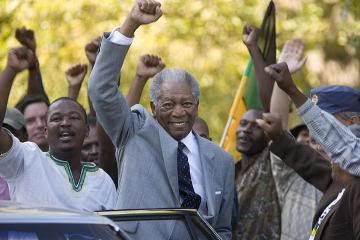

In the opening of Clint Eastwood's "Invictus," there is what appears to be real-life footage of Nelson Mandela, but then, upon further observation, one can notice that it is actually Morgan Freeman in reenacted footage. And from that moment on, Freeman embodies the voice, mannerisms, and even ideologies of Mandela and gives a performance that evokes the spirit of a man who became an icon in South Africa. In this opening moment, Freeman shares a wide, genial smile and gives a portrayal that is calmed, subdued, and charming. He infuses Mandela's speeches with the same grace he gives when he, well, when he plays God. Here's a movie that, in its serious, classical, handsome, and well-produced style and direction, for which Eastwood has become a trademark, is an Academy Award contender automatically because it deals with a worthy subject in the hands of an intelligent director with superb actors dealing with real-life people. And in that respect, it succeeds as a great movie.
The movie takes place in the 1990s when Nelson Mandela was elected the country's first black president after being in prison for 27 years. The challenge facing Mandela upon his election was finding a way to make peace with the apartheid forces that had originally put him in jail. His weapon? Forgiveness. The Afrikaner nationlists living in South Africa are viewed as the enemy, and so Mandela's vote into office had them waiting for his payback. It never came. Instead, Mandela embraced his position and took it as an opportunity to unite his country that had been so harshly divided by racism. The politics of the film have deeper implications that go beyond the time and the place and breach quite blatantly into today. Obama's name of course never gets mentioned (how could it?), but we know in the back of our minds the historical analogies being made.
Mandela turns to the all white (save for one player, Chester Williams) rugby team, the Springboks captained by Francois Pienaar (Matt Damon). The core of the movie rests in Mandela's counterintuitive decision of promoting support for the Springboks even though they were mostly hated by the nation's blacks. The fascinating aspect of the sports drama portion of the film is the way in which it fits into the political drama already unfolding. And even more fascinating is that it was simply because Mandela was a loyal fan of rugby. Both stories are substantial on their own merit, but together they make for a more potent and moving experience. While the climactic moment of the World Cup match is predictable, and although Eastwood spends a rather unnecessarily lengthy 20 minutes on it, it is still a moment that is earned. In any case, the weight of the moment resonates throughout the film's final scenes, and when the fade to black over Mandela's face arrives with the words to the Invictus poem being read aloud, it'll hit you.
Based on John Carlin's book, "Playing the Enemy: Nelson Mandela and the Game that Made a Nation," Eastwood and his screenwriter Anthony Peckham tell the story with straightforward assertiveness that doesn't pour on the glorification as Hollywood could've done with this underdog tale. Matt Damon plays the leader of these underdogs, sporting a beefed-up physique and platinum blonde hair, and he is admirable in the role. Francois visits the very cell where Mandela was held prisoner, and, as the film was shot on location, we're shown the actual cell. There is a chair and a blanket on the floor, and upon seeing that image, you can't help but wonder how this man waited so patiently in faith, and even, after all that, still had the courage for forgiveness and not revenge. For Francois, ever since a first visit with Mandela for tea in his office, he had become the greatest man he had ever met.





No comments:
Post a Comment